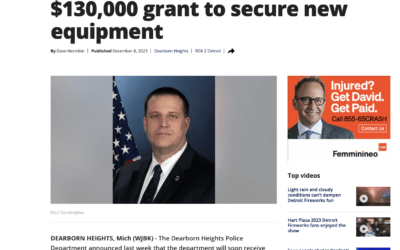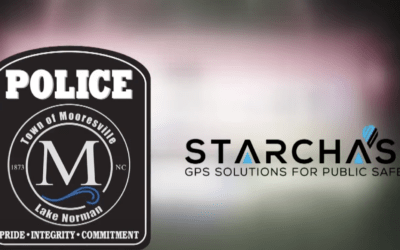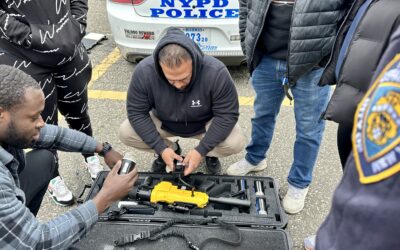Former judge pushes for solutions amid growing number of pursuit fatalities
Former judge pushes for solutions amid growing number of innocent victims killed in police pursuits
By Nate Morabito (WCNC), Sarah Beckman //
September 8, 2022
CHARLOTTE, N.C. — A state lawmaker is calling for action, concerned about the record number of innocent victims killed in the aftermath of police pursuits, including two bystanders who died in as many weeks this year in Charlotte.
WCNC Charlotte’s analysis of the most recently available National Highway Traffic Safety Administration data found North Carolina recorded a 24-year high of 16 fatal pursuit crashes in 2020. The state was tied for seventh nationally that year for the number of deadly pursuit crashes.
Former judge Sen. Toby Fitch, a Democrat representing North Carolina’s 4th District, believes there must be a better way to keep the public safe. Fitch also knows split-second decisions made by the police to give chase sometimes cause more harm than good.
“It does bother me and it has bothered me for a long time as a practicing attorney and as a judge,” Fitch told WCNC Charlotte. “I think there’s action that needs to be taken. I am interested and willing to sit down and make this an issue.”
Fitch sits on North Carolina’s Select Criminal Reform Committee and says he’d like to see the political will to solve this problem.
“I’m sure that people getting together of good mind can come to a conclusion that would make good sense as to how you handle these types of situations,” Fitch said. “The problem has been, in my opinion, that we haven’t discussed the issue. The will is always there on my behalf to make a better, more perfect situation. I’m just not sure that same will exists for everybody.”
He suggested WCNC Charlotte also talk to fellow Sen. Danny Britt (R), NC-District 13, who co-chairs the oversight committee. In response to WCNC Charlotte’s multiple requests for an interview, Britt’s legislative assistant said he was unavailable.
Just last year, lawmakers in Washington state greatly restricted when police can pursue suspects.
In North Carolina, a varying range of department policies dictate when officers can give chase. Chief Damon Williams, president of the State Association of Chiefs of Police, believes officers need that discretion.
“There’s not one solution for every community,” Williams said. “Every community is different. Some major metropolitan areas have the resources to pursue with stop-sticks and helicopters. Some of the rural departments don’t have that.”
Pursuit expert Geoff Alpert, a professor of criminology and criminal justice at the University of South Carolina, doesn’t buy that reasoning.
“Good police work will find someone who flees from you,” Alpert said. “Even those who get away at the moment can be tracked down.”
Alpert has published some of the leading research on police chases. He told WCNC Charlotte that attempted traffic stops — escalated into pursuits by law enforcement officers — can fuel a driver’s often irrational desire to get away.
“The data show that people flee for not wanting a ticket,” he said. “They’re scared of the police. They’re just not making good decisions and they flee for really bad reasons.”
Alpert is a strong believer in strict, well-defined policies and laws, as well as better training. He pointed to New Jersey, where the attorney general defines clear pursuit guidelines for the entire state.
Alpert said police should only be allowed to pursue drivers when there’s a violent felony involved.
“The person fleeing is at fault, but police are trained and are there to deal with people who aren’t making good decisions, can’t make good decisions,” he said. “There’s got to be an adult in the room and it’s not the person fleeing.”
Alpert also supports advances in technology, including tools that help track drivers on the run. Williams warned that equipment is likely “extremely expensive.”
“Of course, it can be expensive, but it’s a heck of a lot less expensive than someone’s life,” Alpert said in response.
Agencies in most states, including the Mooresville Police Department, rely on StarChase. The device, which costs $5,000 per cruiser plus a yearly subscription fee, launches a tracker onto a fleeing car.
StarChase president Trevor Fischbach said the technology allows police to back off and track the suspect on GPS, which slows a driver down within two minutes.
We have no fatalities on the StarChase side of the balance sheet, no injuries, minimal property damage,” Fischbach told WCNC Charlotte. “It really does rewrite the outcome.”
Newly obtained Charlotte-Mecklenburg Police Department data shows that in the first four months of 2022 alone, 40% of police chases ended in a crash, including at least two crashes where innocent people died.
One of those victims was Brittany Webb.
“We’re still hurting,” her mother Carol Willis said. “We’re missing Brittany greatly.”
In the minutes before a driver crashed head-on into the car carrying an unbelted Webb and two others, CMPD officers tried to pull over a Jeep for driving with a covered, but still visible license plate. Records show the officers made “several separate attempts” to stop the driver before the Jeep sped up and drove into the wrong lane, at which point they “disengaged” for the last time. CMPD later suspended the two officers involved.
WCNC Charlotte recently filed a petition in Mecklenburg County court to release body camera footage from the moments before, during and after the fatal crash. A judge is expected to set a hearing date in the near future to consider WCNC Charlotte’s argument for release.
Department records show the number of CMPD pursuits has more than quadrupled over the last decade. Agency data reveal roughly one out of every four CMPD pursuits since 2010 has resulted in a collision.
Four months after WCNC Charlotte requested death and injury pursuit outcomes, CMPD has yet to provide those records.
Webb is among at least 4,200 bystanders killed nationwide since 1982 in the aftermath of police pursuits.
“It’s just a whole lot of pain,” his sister Miahia Mansell-Green said. “It still hurts. While we still try to grieve him, we have to relive that moment that took him away from us.”
Mansell, a father of three, died in Greenville, South Carolina, as a passenger in a fleeing car in 2019.
“Sometimes I forget that he’s gone because it’s just so unreal,” his sister said.
WCNC Charlotte’s analysis of NHTSA data revealed South Carolina and North Carolina have accounted for nearly 6% of all fatal pursuit crashes in the United States since 1982 with more than 675 between the two states.
“There is an answer to any problem that exists,” Fitch said. “It’s a matter of whether or not we have the will to do the things that we have not normally done for the sake of having a more safe community.”



